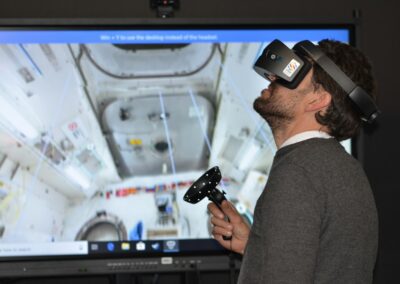Revolutionizing Travel with Dynamic and Personalized Content
The Intersection of AI and AR in the Travel Industry
AI-enhanced AR travel applications are set to transform the travel industry by offering dynamic and personalized content for travelers. By integrating Artificial Intelligence (AI) with Augmented Reality (AR), these applications can provide users with real-time, context-sensitive information that enhances their travel experiences. This technological synergy not only enriches the way tourists explore new destinations but also promotes more sustainable and responsible travel practices.
In regions such as Saudi Arabia, the UAE, Riyadh, and Dubai, where tourism plays a crucial role in the economy, AI-enhanced AR applications can significantly boost the attractiveness and sustainability of tourism offerings. AI algorithms can analyze vast amounts of data to understand travelers’ preferences, habits, and behaviors. This data-driven approach enables AR applications to deliver personalized recommendations, such as the best times to visit attractions, eco-friendly transportation options, and nearby dining experiences tailored to individual tastes.
Furthermore, AI can enhance the educational aspect of AR travel guides by providing rich, interactive content about local culture, history, and environmental conservation efforts. For example, while exploring a historical site, travelers can use AR to view reconstructed scenes from the past, complete with AI-generated narratives that bring history to life. This immersive experience can foster a deeper appreciation for the destination and encourage tourists to engage in more respectful and sustainable tourism practices.
Personalization and Real-Time Adaptation
The primary advantage of AI-enhanced AR travel applications is their ability to offer highly personalized experiences. AI can process data from various sources, including user inputs, social media activity, and travel history, to create tailored itineraries that cater to individual preferences. This level of personalization ensures that each traveler’s experience is unique and memorable, enhancing satisfaction and engagement.
For instance, an AI-powered AR app can recommend activities based on the weather forecast, the traveler’s location, and current events happening nearby. If a user shows interest in cultural heritage, the app might highlight museums, historical landmarks, and traditional festivals. Alternatively, for an eco-conscious traveler, the app could suggest nature trails, wildlife reserves, and sustainable dining options. This dynamic adaptation not only improves the user experience but also promotes sustainable travel choices.
Real-time adaptation is another key feature of AI-enhanced AR travel applications. As travelers move through their journey, AI can continuously update recommendations based on real-time data, such as changes in weather, traffic conditions, or crowd levels at popular attractions. This flexibility allows travelers to make informed decisions on the go, optimizing their itinerary for maximum enjoyment and minimal environmental impact.
Enhancing Sustainability and Responsible Tourism
The integration of AI-enhanced AR travel applications can significantly contribute to sustainable and responsible tourism. By providing personalized recommendations that prioritize eco-friendly options, these applications can help reduce the environmental footprint of travelers. For example, AI can suggest public transportation routes, bike-sharing programs, and walking paths over car rentals and taxis, promoting greener travel habits.
In addition, AI can enhance awareness of local conservation efforts and cultural preservation initiatives. Travelers can use AR to learn about endangered species in a region, understand the importance of preserving historical sites, and discover how their actions can positively impact the environment. This educational component is crucial for fostering a culture of responsible tourism, where travelers are more conscious of their impact on the destinations they visit.
Moreover, AI-enhanced AR applications can support the distribution of tourism benefits more evenly across regions. By highlighting lesser-known attractions and off-the-beaten-path destinations, these applications can divert tourist traffic from overcrowded sites, reducing pressure on popular landmarks and spreading economic benefits to smaller communities. This approach not only enhances the sustainability of tourism but also enriches the traveler’s experience by offering unique and authentic encounters.
Implementing AI and AR in the Travel Industry
For AI-enhanced AR travel applications to reach their full potential, strategic implementation and collaboration among stakeholders are essential. Business executives, mid-level managers, and entrepreneurs in the travel and technology sectors must prioritize the development of these applications, investing in the necessary infrastructure and talent. Partnerships with technology providers, local governments, and environmental organizations can ensure that the applications are both innovative and aligned with sustainability goals.
Leadership in this area requires a forward-thinking approach, embracing continuous innovation and adaptation. Executives should stay informed about the latest advancements in AI and AR technologies and explore how these can be integrated into their offerings. Executive coaching services can help leaders develop the skills needed to drive these initiatives, fostering a culture of sustainability and technological excellence within their organizations.
Furthermore, engaging travelers through effective marketing and educational campaigns is crucial. Travelers need to understand the benefits of using AI-enhanced AR applications and how these tools can enrich their travel experiences while promoting responsible behavior. Providing clear instructions and support for using these applications can enhance user adoption and satisfaction, ensuring that the technology delivers its intended benefits.
Conclusion: The Future of Travel with AI-Enhanced AR
The integration of AI-enhanced AR travel applications represents a transformative opportunity for the travel industry, offering dynamic, personalized, and sustainable travel experiences. By leveraging the power of AI to analyze data and deliver tailored recommendations, these applications can enhance the way travelers explore destinations while promoting eco-friendly and responsible tourism practices.
For regions like Saudi Arabia, the UAE, Riyadh, and Dubai, embracing AI and AR technologies can boost tourism appeal and contribute to long-term environmental sustainability. Effective leadership and strategic planning are essential for harnessing the full potential of these technologies, ensuring that they are implemented in ways that benefit both travelers and the environment. By prioritizing innovation and sustainability, the travel industry can create enriching experiences that preserve the beauty and heritage of destinations for future generations.
#AIEnhancedAR #SustainableTourism #EcoFriendlyTravel #ResponsibleTourism #AugmentedReality #SaudiArabia #UAE #Riyadh #Dubai #ArtificialIntelligence #Blockchain #TheMetaverse #GenerativeAI #ExecutiveCoaching #BusinessSuccess #Leadership #ProjectManagement























